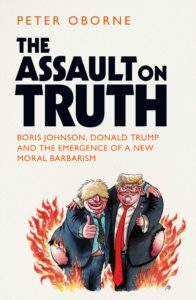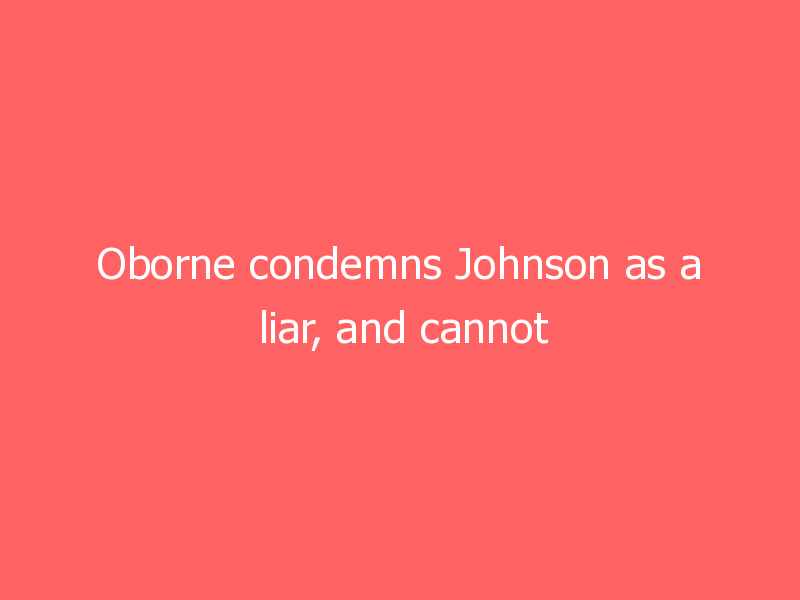Oborne condemns Johnson as a liar, and cannot understand why many voters believe the PM is telling the truth

The Assault on Truth: Boris Johnson, Donald Trump and the Emergence of a New Moral Barbarism by Peter Oborne
Boris Johnson is a liar. This charge is often made by the Prime Minister’s critics, and Peter Oborne makes it with tremendous vehemence:
“Standards of truth telling, I will prove, collapsed at the precise moment Boris Johnson and his associates entered 10 Downing Street in the early afternoon of 24 July 2019.”
Older readers may remember that in 2005 Oborne brought out The Rise of Political Lying, in which he declared: “Britain now lives in a post-truth political environment.”
In the book under review, Oborne recalls the justification used by New Labour apparatchiks for departing from the truth:
“They felt (with good reason) that a venal Tory-supporting press had distorted, misrepresented and often lied about Labour policy. So Blair and his advisers felt there was no way that Labour could win power, let alone retain it, if it relied on telling the truth.”
It now turns out that although Blair’s lies were appalling, things were going to get worse:
“Tony Blair paved the way for Boris Johnson, who has created a new epistemological universe… As a liar he cannot be compared to Tony Blair. He has never needed a noble justification for lying. He lies habitually, with impunity, and without conscience. This puts his dishonesty into the same category as Donald Trump’s. Although far below Trump’s in scale and stridency, it is epic by British standards.”
Oborne contends that neither Trump nor Johnson “possessed the moral seriousness to cope with a public health catastrophe like coronavirus”. He holds up Angela Merkel as a leader who has moral seriousness, which is “why many fewer Germans died”:
“It is excruciating and a matter of deep national embarrassment to compare Angela Merkel’s good sense with never-ending iterations of bombast, exaggeration and falsehood from Boris Johnson once he had returned to work towards the end of April [2020].”
Johnson’s mendacity was also shown during the general election campaign he fought at the end of 2019, which according to Oborne consisted of “one lie after another”:
“The Prime Minister’s biggest lies involved Brexit… In Parliament on 22 October [2019] he said: ‘There will be no checks between Great Britain and Northern Ireland.’ This bare-faced lie in all its moral squalor remains on the Commons order paper.”
I have just read the Hansard which contains the words he quotes, and it seems to me that taken together, though there is room for honest disagreement about this, the Prime Minister’s replies to MPs, many of whom challenged him about Northern Ireland, are slightly less disgraceful than Oborne thinks.
Some may wonder to what extent, during an almost intolerably complicated negotiation such as Brexit, an unwearying regard for truth can be the only guide while discovering a way through innumerable difficulties and inconsistencies and maintaining sufficient levels of parliamentary and public support.
Theresa May is in many ways an admirable woman, a model of Anglican conscientiousness, but she was not subtle enough to be a successful negotiator. She kept tying herself in knots by making promises she could not keep.
However keen one may be during a negotiation to build trust by telling the truth, one might find oneself treated with a degree of scorn if one’s opening bid consisted of a full account of the concessions one was prepared, if necessary, to make.
Any Prime Minister is bound, as a matter of honour, to obtain the best possible result for their country, and then to promote that result. The methods by which a leader finds out what it is possible to get may well include bluff and feint, likely to be followed by a degree of wishful thinking about whatever settlement has actually been reached.
Oborne is absolutely right that ministers must not lie to the House of Commons. His commitment to this point is admirable. If no one ever got hot under the collar about this, the rule would become even harder to uphold.
But it is also vital that MPs do not call each other liars. This is not just some antiquated point of good manners.
The problem with calling your opponent a liar is that debate then becomes impossible. Here is a fatal drawback to Oborne’s approach.
By condemning Johnson as “a fabricator and cheat”, he makes it pointless to say, “The Prime Minister repeatedly assured us there would be no checks between Great Britain and Northern Ireland, yet we are reliably informed that such checks are being carried out. Can the Prime Minister please account for this discrepancy?”
Such an inquiry, if persisted with (and the Commons gives much scope for persistence), becomes embarrassing.
Trump’s opponents thought, wrongly, they could sink him by proving to the world that he was a liar. It would be a pity if Johnson’s opponents were to make the same mistake.
For it leaves those opponents in possession of an untrammelled but intolerant self-righteousness which makes them sound like so many ranting, holier-than-thou hypocrites.
Hillary Clinton ended up in that trap in 2016. She and her supporters in newspapers like The New York Times were unable any longer to comprehend why any decent person could decide to vote for Trump. Her priggish moralising became a barrier between her and her compatriots.
Oborne’s approach is in danger of degenerating into such a crude simplification of how politics is or can be conducted that it too becomes a barrier rather than an aid to understanding.
Does Johnson ever tell the truth? In their eagerness to condemn him, his opponents do not pause to ask that question, or even to see its relevance. For them, the Prime Minister is an infinitely despicable populist, who does not deserve a fair hearing.
Yet many of Johnson’s voters thought he was telling the truth about Brexit, and couldn’t care less whether on some of the points with which he adorned his case he was indulging in hyperbole.
To them it didn’t matter whether the GBP350 million figure on the side of the bus during the 2016 referendum was literally true. The general truth that we were sending quite a bit of money to Brussels was scandalous enough.
As a woman in West Bromwich put it to ConHome during the last general election:
“I will definitely vote for Boris, liar, cheat and fool! And for Brexit! I want to get out.”
Such voters are not interested in the points of detail which Oborne cites, with footnotes, in order to prove Johnson a liar. They reckon all politicians are liars. What they want to know is whether Johnson is on their side and will get things done – whether in that respect he is honest.
To give another example, they want to know whether he can be relied on to support the NHS, not whether he will get round to building the implausibly large number of hospitals he has promised to build.
Oborne is a brilliant journalist, but in this book he has allowed himself to become blinded by moral indignation.
Among the qualities one would hope, in addition to honesty, to find in a Prime Minister are courage, persistence, resilience, judgement, intelligence, eloquence, firmness, flexibility, principle, pragmatism, and when necessary a degree of cunning in defence of the national interest.
An ability to form some connection with the wider public is also required, which may demand a willingness to exaggerate certain aspects of your programme (“You want to have your cake and eat it? I think you will approve of our manifesto”), a certain brio, even a certain impudent lightness of touch.
Moral seriousness is not enough. Oborne recognises this when he quotes Malcolm Muggeridge’s remark:
“To succeed pre-eminently in English public life it is necessary to conform either to the popular image of a bookie or of a clergyman.”
Muggeridge went on:
“Churchill being a perfect example of the former, Halifax of the latter.”
Oborne omits the two examples, but admits that by making such harsh charges against Johnson, he is suggesting that standards used to be higher:
“It is unimaginable that a compulsive liar such as Johnson could have been chosen to lead the Conservative Party in a previous era, let alone elected prime minister. There was a time, before the emergence of political parties as we know them today, when it was normal for ministers to lie, cheat and bribe. In the eighteenth century, many of Britain’s most famous writers and journalists were paid by the government to apply their literary skills to undermine opponents. Meanwhile ministers made huge sums from corruption…”
These fulminations are unfair to many writers, and also to many Prime Ministers. Sir Robert Walpole, conventionally regarded as the first Prime Minister, was assailed by the best writers of his time, including Swift, Pope, Gay and Fielding.
Walpole was so annoyed by the portrayal of himself as a thief in The Beggar’s Opera, and by offensive allusions in the same work to his mistress, that he arranged for the passing in 1737 of the Licensing Act, under which, until 1968, all new plays had to be approved by the Lord Chamberlain. Gay, the offending author, had his next play banned.
Walpole and his family did, unquestionably, make a packet. Visit his house, Houghton Hall, and wonder at it.
But Walpole was also a genius who restored confidence after the South Sea Bubble, encouraged trade, lowered taxes and for many years kept the country at peace. As he remarked to Queen Caroline in 1734:
“Madam, there are fifty thousand men slain this year in Europe, and not one Englishman.”
Venality does not necessarily prevent someone being a successful Prime Minister, but in any case, most holders of the office have been more attracted by power than money, and many of them ended their careers poorer than when they started.
In January 1784, shortly after becoming Prime Minister, Pitt the Younger made a good impression on the country, and confounded his opponents, by declining to award himself the Clerkship of the Pells, a sinecure office worth GBP3,000 a year.
Pitt’s father had likewise made a good impression on the country, and demonstrated his patriotism, by declining to enrich himself at public expense during his nine years as Paymaster General.
Oborne is right to say that “the Victorians erected a series of protections against deceit and corruption”, but wrong to imply that all Prime Ministers lived up to these standards.
Benjamin Disraeli observed pre-Victorian standards. He was described by Lord Salisbury as an “adventurer” who was “without principles or honesty”, yet he won even Salisbury round, and became the only Conservative – indeed the only Prime Minister – to inspire a posthumous cult.
A few years ago Oborne wrote a wonderful book, reviewed here, about Trump’s use of Twitter in order to become President.
Oborne worked for Johnson at The Spectator, so knows him better than he knows Trump, yet one would think from this book that he does not know him at all.
Originally found on Conservative Home Read More








